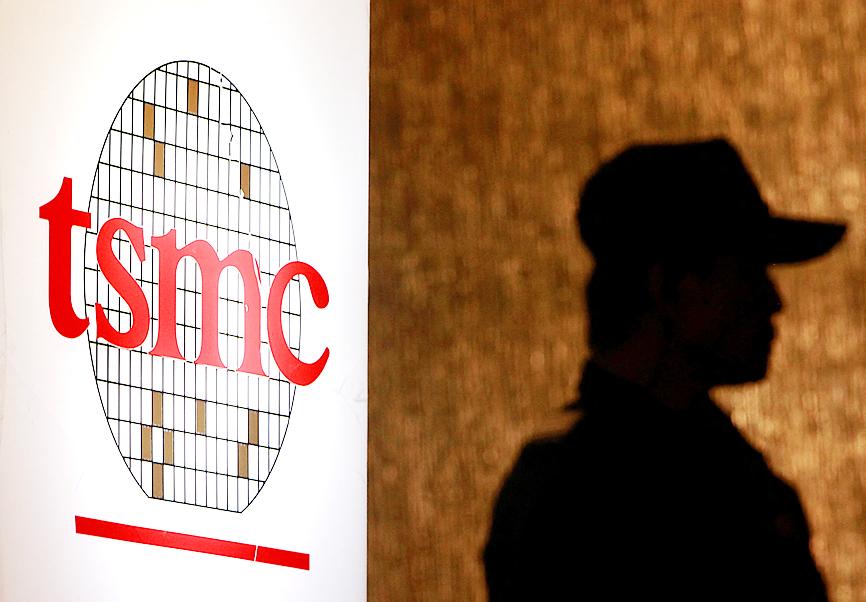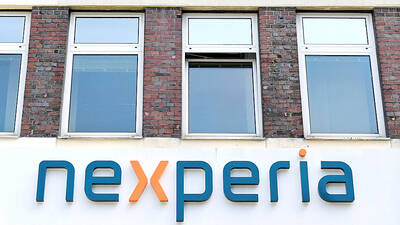The Financial Supervisory Commission (FSC) has cleared 10 foreign brokerages of misleading investors following a probe into their sales of Taiwan Semiconductor Manufacturing Co (TSMC, 台積電) shares.
The commission found the firms, which include Goldman Sachs Group Inc, Citigroup Inc and UBS Group AG, had committed no wrongdoing in their trading of Taiwan’s biggest company, according to a commission report prepared for lawmakers and seen by Bloomberg.
The commission launched the investigation last month at the behest of legislators who complained the brokerages had issued reports on TSMC with “buy” recommendations, while their trading desks sold large amounts of the company’s shares between Dec. 1 last year and March 21.

Photo: Pichi Chuang, Reuters
The brokerages sold TSMC shares at their clients’ request, the report found, adding that their clients are mostly institutional investors who adjust their asset allocations based on their own global investment considerations, not necessarily following advice of research reports.
None of the sales involved the institutions’ proprietary trading, the report concluded.
After scrutinizing 45 research notes issued during the period in question, the regulators found that nine of the brokerages had changed their views on TSMC’s outlook, but had updated their research notes in a timely manner in line with stock exchange regulations and the companies’ internal controls.
The companies subject to the probe were Goldman Sachs, Citigroup, UBS, Morgan Stanley, Merrill Lynch, Nomura Holdings Inc, JPMorgan Chase & Co, Daiwa-Cathay Capital Markets Co (大和國泰證券), CL Securities Taiwan Co (台灣匯立證券) and HSBC Holdings PLC.
The increased scrutiny of TSMC’s shares has done little to arrest their slide. The shares have fallen more than 7 percent to NT$547 as of yesterday since the probe began in late last month. Shares have plunged almost 20 percent since reaching a record high of NT$683 on Jan. 17.
The declines have been driven by equity outflows out of the country. Foreign investors have pulled a net NT$172.5 billion out of the benchmark market this month.
In the report, regulators recommended that the two main local stock exchanges do more to explain to investors that the trading data they release include financial institutions’ prop trading and client trading data. The bourses should also strengthen investor education to improve their understanding of research reports.
The commission also said it would consider strengthening its management of research notes to protect investor rights and maintain trading order.
The regulator is known for keeping a tight grip on financial companies, especially in cases like front-running trades or when retail investors are harmed. It penalized Deutsche Bank AG and three other foreign lenders last year after a probe into speculation on the surging local currency a year earlier involving grain companies.

Jensen Huang (黃仁勳), founder and CEO of US-based artificial intelligence chip designer Nvidia Corp and Taiwan Semiconductor Manufacturing Co (TSMC, 台積電) on Friday celebrated the first Nvidia Blackwell wafer produced on US soil. Huang visited TSMC’s advanced wafer fab in the US state of Arizona and joined the Taiwanese chipmaker’s executives to witness the efforts to “build the infrastructure that powers the world’s AI factories, right here in America,” Nvidia said in a statement. At the event, Huang joined Y.L. Wang (王英郎), vice president of operations at TSMC, in signing their names on the Blackwell wafer to

AI BOOST: Although Taiwan’s reliance on Chinese rare earth elements is limited, it could face indirect impacts from supply issues and price volatility, an economist said DBS Bank Ltd (星展銀行) has sharply raised its forecast for Taiwan’s economic growth this year to 5.6 percent, citing stronger-than-expected exports and investment linked to artificial intelligence (AI), as it said that the current momentum could peak soon. The acceleration of the global AI race has fueled a surge in Taiwan’s AI-related capital spending and exports of information and communications technology (ICT) products, which have been key drivers of growth this year. “We have revised our GDP forecast for Taiwan upward to 5.6 percent from 4 percent, an upgrade that mainly reflects stronger-than-expected AI-related exports and investment in the third

RARE EARTHS: The call between the US Treasury Secretary and his Chinese counterpart came as Washington sought to rally G7 partners in response to China’s export controls China and the US on Saturday agreed to conduct another round of trade negotiations in the coming week, as the world’s two biggest economies seek to avoid another damaging tit-for-tat tariff battle. Beijing last week announced sweeping controls on the critical rare earths industry, prompting US President Donald Trump to threaten 100 percent tariffs on imports from China in retaliation. Trump had also threatened to cancel his expected meeting with Chinese President Xi Jinping (習近平) in South Korea later this month on the sidelines of the APEC summit. In the latest indication of efforts to resolve their dispute, Chinese state media reported that

CHINESE EXPORT CURBS: A dispute between China and the Netherlands could halt chip supply, affecting vehicle production, US and European auto associations said Groups representing major automakers late on Thursday warned that a chip disruption stemming from a dispute between China and the Dutch government could quickly affect US auto production. Automakers and their suppliers received notice from chipmaker Nexperia (安世半導體) last week that it could no longer guarantee delivery of its chips, the European Automobile Manufacturers Association said, adding that manufacturing could be significantly disrupted. In the US, the Alliance for Automotive Innovation, which represents General Motors, Toyota, Ford, Volkswagen, Hyundai and nearly all other major automakers, urged a quick resolution. “If the shipment of automotive chips doesn’t resume — quickly — it’s going to